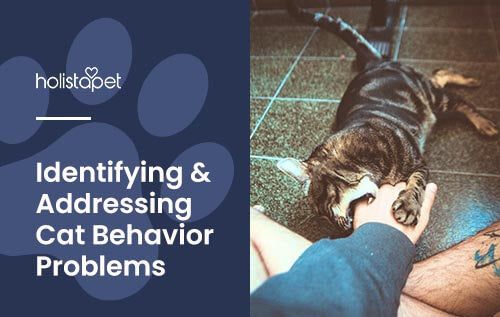From aggressive behaviors to litter box problems, cat behavior issues can be challenging for pet owners and their feline friends. Understanding these problems in cats is the first step towards finding effective solutions and maintaining peace at home.
In this handy guide, we'll explore the most common feline behavior problems. We'll discuss their common causes plus share some helpful strategies you can try out. What's more, we'll explain how pet wellness products like CBD for cats can help your kitty stay calm and zen. Let's begin.
Are Cat Behavior Problems Common?
Yes, cat behavioral issues are quite common. Many cats will exhibit some kind of unwanted behavior at some point in their lives. Aggressive behavior, inappropriate elimination, and unwanted scratching are usual concerns cat owners report.
Understanding these common cat behavior problems is key to helping your kitty act and feel better. Some issues may arise from environmental factors, while others might be due to medical conditions or stressful situations. Spotting the signs early and seeking the right solutions can help you maintain a harmonious relationship with your feline friend.
Cat Behavior Issues Explained + Suggested Solutions
Various factors can cause behavior issues in cats. Therefore, each problem needs a custom approach. In the following sections, we'll discuss specific feline behavior problems and suggest practical solutions.

1. Aggression Towards People or Pets
Feline aggression can be problematic, especially if you're used to a calm, sweet kitty. When they exhibit aggression, cats may hiss, bite, or swat at other pets or even humans.
- Reasons
- Territorial Behavior. Cats may act aggressively to defend their territory.
- Fear. A fearful cat may attack when they feel threatened.
- Discomfort or Hormonal Changes. Medical problems can trigger aggressive responses.
- Maternal Aggression. Mother cats can become aggressive when protecting their kittens.
- Suggested Solutions
- Behavior Modification Techniques. Gradual exposure and positive reinforcement can help counter aggressive behavior.
- CBD for Cats. CBD (cannabidiol) interacts with a cat's endocannabinoid system (ECS), which plays a role in regulating their mood and responses. When you incorporate CBD into your kitty's routine, you might notice them relaxing more and acting out less.
- Veterinary Consultation. A vet can rule out medical problems and offer guidance on managing this behavioral problem.
Related Post: Top 9 Aggressive Cat Breeds
2. Scratching Furniture
Cats scratching furniture can be frustrating for pet owners. This unwanted behavior involves kitties using their claws to scratch and mark various surfaces, often damaging household items.
- Reasons
- Territorial Marking. Cats scratch to mark their territory with visual and scent markers.
- Exercise and Maintenance. Scratching helps felines stretch their muscles and maintain healthy claws.
- Suggested Solutions
- Provide Scratching Posts. Place multiple scratching posts around your home. Ensure the posts are sturdy and tall enough for a full stretch.
- Use Deterrents. Apply double-sided sticky tape or special sprays on furniture to discourage unwanted scratching. The sticky texture can deter cats and redirect them to appropriate scratching areas.
- Positive Reinforcement. Reward your cat with treats or affection when they use their scratching post. This can encourage them to repeat the desired behavior.
3. Physical Discomfort
Cats feeling discomfort may avoid physical contact. They may also exhibit irritability and aggressive behavior. This issue can affect all felines, from kittens to adult cats.
- Reasons
- Medical Issues. Conditions like arthritis, dental issues, or injuries can cause discomfort.
- Discomfort or Hormonal Changes. These can lead to behavioral changes, making pets more irritable.
- Suggested Solutions
- Vet Visits. Regular checkups can help catch and treat any underlying medical issues causing discomfort.
- CBD for Cats. CBD products may help soothe physical discomfort by interacting with the ECS, which regulates discomfort and irritation.
- Comfortable Environment. A quiet and safe space to rest with soft bedding can help alleviate discomfort.
4. House Soiling
Sudden house soiling can be quite alarming. When cats go potty outside their litter box, it could point to serious health problems.
- Reasons
- Medical Issues. Conditions like urinary tract infections or bladder stones can lead to inappropriate elimination.
- Stress. Changes in a cat's environment or routine can cause them to worry, possibly leading to potty accidents.
- Litter Box Issues. Dirty litter boxes or an unsuitable location can deter cats from using them.
- Suggested Solutions
- Vet Consult. A vet can diagnose and treat any medical problem causing these accidents.
- Clean and Accessible Litter Boxes. Place litter boxes in quiet, accessible areas, and keep them clean. Multiple cats may need multiple boxes to avoid territorial issues.
- Behavior Modification Techniques. Gradual changes and positive reinforcement can help reduce accidents.
5. Urine Marking
Urine marking involves cats spraying small amounts of urine on vertical surfaces. This behavior problem is common in both female and male cats and can be frustrating for owners.
- Reasons
- Territorial Behavior. Felines mark their territory to communicate with other cats.
- Fear or Worry. Changes in their environment or routine can increase urine marking.
- Health Issues. Urinary tract infections or other medical conditions can contribute to urinary behavioral problems in cats.
- Suggested Solutions
- Vet Visit. Your vet can help rule out any medical issues that might be causing this behavior.
- Behavior Modification. Use rewards and praise to encourage proper behavior.
- Clean Thoroughly. Use enzymatic cleaners to remove all traces of urine. Cats tend to mark the same spot again if they can still smell their scent.

6. Excessive Sleeping
Cats love to sleep, but excessive snoozing can sometimes indicate an underlying issue. Cat parents need to distinguish between normal and abnormal sleeping patterns.
- Reasons
- Age. Older cats tend to sleep more as part of the natural aging process.
- Boredom. Felines with little stimulation or exercise may sleep out of boredom.
- Health Issues. Conditions like hypothyroidism or anemia can cause increased sleepiness.
- Suggested Solutions
- Vet Checkup. If you notice a sudden change in your cat's sleeping habits, consult a vet to rule out any health problems.
- Provide Stimulation. Engage your cat with exercise-inducing toys, scratching posts, and interactive play to keep them active and mentally stimulated.
- Comfortable Resting Areas. Ensure your kitty has cozy and quiet spots for naps when it's their actual rest time.
7. Nighttime Walking or Activity
Nighttime walking or activity can be disruptive for pet owners. As you probably know, cats become more active and vocal at night. This behavior can stem from various factors.
- Reasons
- Natural Cat Behavior. Cats are naturally nocturnal, with peak activity during dusk and dawn.
- Boredom. Lack of stimulation during the day can cause more nighttime activity.
- Health Issues. Discomfort can make a cat restless at night.
- Suggested Solutions.
- More Daytime Activities. Engage your cat with exercise-inducing toys and interactive play during the day to tire them out.
- CBD for Cats. CBD may help calm anxious behaviors and reduce nighttime restlessness in cats.
- Comfortable Sleeping Area. Provide a comfortable and quiet sleeping area free from loud noises and disturbances. This kind of environment can help encourage rest.
8. Excessive Vocalization
Vocalization problems in cats can be a sign of various issues, from seeking attention to underlying health problems. If your cat is being unusually loud, they may need help.
- Reasons
- Attention-Seeking. Your cat may meow excessively to get your attention.
- Hunger. Some cats vocalize when they are hungry or expecting food.
- Health Problems. Conditions like hyperthyroidism or cognitive dysfunction can lead to increased vocalization.
- Suggested Solutions
- Regular Feeding Schedule. Maintain a consistent feeding routine to reduce hunger-related vocalization.
- Interactive Play. Spend quality time playing with your kitty to give them attention and stimulation.
- Vet Consultation. If the excessive vocalization persists, consult your vet to rule out any underlying health issues.
9. Anxiousness and Stress
Anxious feline behaviors can manifest as hiding, excessive licking or grooming, and aggression. Identifying and addressing the root cause is a must.
- Reasons
- Environmental Changes. Moving to a new home or rearranging furniture can cause a cat to worry and feel uncomfortable.
- Loud Noises. Thunderstorms, fireworks, or loud household noises can be distressing for cats.
- Other Pets. The presence of other animals, especially if they are new to the household, can create tension.
- Suggested Solutions
- Safe Space. Provide a quiet, comfortable area where your cat can retreat and feel secure.
- Behavior Modification. Use praise and treats to encourage calm behaviors and gradually expose your cat to different stimuli.
- CBD for Cats. CBD may help promote relaxation in pets during distressing times.
10. Fearful or Hiding
Hiding or fear aggression can indicate that your cat is experiencing distress. This behavior is common when encountering new environments, people, or animals.
- Reasons
- New Environments. Moving to a new home or rearranging furniture can greatly affect fearful cats.
- Other Pets. Introducing new pets can make cats feel threatened and start hiding.
- Loud Noises. Thunderstorms, fireworks, and other loud sounds can frighten felines.
- Suggested Solutions.
- Safe space. Ensure your cat has a quiet, comfortable area where they can retreat and feel safe.
- Gradual Exposure. Slowly introduce your cat to new environments or pets. Rewarding them can also help them associate new experiences with positive outcomes.
- CBD for Cats. CBD products may help reduce fear and promote relaxation. They can help your cat feel more at ease and less likely to hide.
Related Post: Scared Cat: How to Help a Frightened Feline

11. Loss of Appetite
Reduced appetite may indicate underlying behavioral or health issues. It can lead to malnutrition, weight loss, and other problems if ignored.
- Reasons
- Medical Issues. Conditions such as dental issues or gastrointestinal problems can cause a decrease in appetite.
- Anxious Behaviors. Changes in environment or routine can make a cat lose interest in food.
- Food Preferences. Some pets may be picky eaters. Sudden changes in their diet can cause them to eat less.
- Suggested Solutions.
- Veterinary Visit. Consult a vet to rule out any medical issues that might be causing the loss of appetite.
- Stable Routine. Maintain a consistent feeding schedule and environment to reduce your cat's distress.
- CBD for Cats. CBD may help stimulate appetite by interacting with the ECS. Incorporating CBD into your cat's diet may encourage them to eat more regularly.
How Can CBD Help Cat Behavioral Issues?
CBD is a natural compound found in hemp plants. It interacts with the ECS, which helps regulate various bodily processes in felines, including their mood, appetite, and response to discomfort. By supporting this system, CBD can help alleviate many cat behavioral problems.
HolistaPet is the #1 cat CBD supplier in the United States. We offer a range of high-quality CBD products for felines, such as:
Our cat CBD options use broad-spectrum CBD. This means there's no THC (tetrahydrocannabinol), the mind-altering component in cannabis, in our offerings. All our products are natural, gluten-free, non-dairy, non-GMO, third-party lab-tested, and vet-approved. Our CBD chews, treats, and oils can safely bring calming benefits and promote a more balanced demeanor in your beloved kitty.
Benefits of CBD for Cat Behavioral Issues
CBD offers several benefits that can help manage unwanted feline behaviors effectively. Here are some of them:
- Calming and Relaxing Effects. CBD may help reduce anxious behaviors and promote a sense of calm. This is particularly useful for skittish cats.
- May Soothe Physical Discomforts. CBD can help ease discomfort from conditions like joint swelling or muscle aches by interacting with the ECS.
- May Promote Rest and Sleep. CBD can potentially support natural sleep patterns. It may help kitties rest well, especially those restless at night.
- May Promote Appetite. CBD may help stimulate a cat's appetite, especially when they are sick or distressed.
- May Ease Fear. CBD can potentially help reduce fearful behaviors by promoting a balanced mood.
Final Thoughts - Cat Behavior Issues
Living in perfect harmony with your dear kitty is absolutely possible once you understand the reasons behind their actions. When faced with unwanted cat behaviors, identify the root causes first and apply the appropriate solutions. One of them could be CBD for cats from reputable brands like HolistaPet.
Don't let strange behaviors put a gap between you and your cat. With the right knowledge and a proactive approach, you can get your feline friend feeling like their usual self again. Remember, a calm kitty is a happy kitty!



 CBD Oil for Cats - Fast Acting
CBD Oil for Cats - Fast Acting
 CBD Cat Treats - Easy Dose
CBD Cat Treats - Easy Dose
 CBD Calming Chews for Cats - Highly Rated
CBD Calming Chews for Cats - Highly Rated
 CBG Oil for Dogs and Cats - Loved by Thousands
CBG Oil for Dogs and Cats - Loved by Thousands





Leave a comment
All comments are moderated before being published.
This site is protected by hCaptcha and the hCaptcha Privacy Policy and Terms of Service apply.